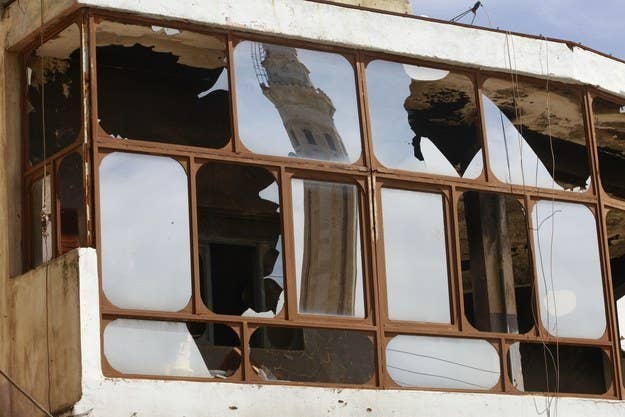
MERSIN, Turkey — Syria's protest movement was in full swing when Hassan Hammami was arrested in August 2011 — dragged from a restaurant in the coastal city of Latakia while at dinner with his family, the back of his shirt pulled over his face.
A wealthy real estate developer from a prominent local clan, he'd put his weight behind the resistance in the city, helping to organize demonstrations and using his stature to lend them credibility. The country-wide revolt was increasingly threatening the regime, which cracked down on men like Hammami, especially in Latakia, the ruling Assad family's home province.
As Hammami was shipped from the city, his most lasting memory of the revolution was of the Friday it erupted there, when people poured from the mosques and into the streets, some with tears of joy running down their cheeks.
He arrived at a Damascus prison run by the feared intelligence services of Syrian President Bashar al-Assad, who was gradually unleashing the full weight of his police state to keep his hold on power. He spent five months in solitary confinement there, interrupted by torture sessions that scarred his back. Then he was then moved to a jail in Homs, where he was to wait out an 18-month sentence amid an ever-growing mass of fellow prisoners, many of them activists like him. The men gleaned what news they could from tightly controlled broadcasts on state TV, from occasional calls with relatives, and, mainly, from the fresh arrivals from the outside.
The newcomers told of crackdowns that grew deadlier by the day. Then they spoke of armed resistance, and eventually of civil war.
Hammami learned that his beloved little brother, 28-year-old Kamal, whom he thought of almost as a son, and who had led the Latakia protests in chants of "freedom," had become a rebel commander. He operated in the liberated mountains outside Latakia, using the nickname Abu Basir.
He learned of an extremist rebel group called the Islamic State of Iraq and Syria, or ISIS, one day this summer, when a friend called him over to the prison's television. ISIS had assassinated a moderate rival in Latakia, and the newscast announced his name. "Isn't that your brother?" the friend said.
Not long afterward, his prison term complete, Hammami was released.
Now 45, he is a tall and stocky man with a disarming demeanor. He went immediately to rejoin the revolution — and seeing it through his ill-adjusted eyes, he recoiled with horror at the nightmare it had become.
The first shock came on a drive around Latakia. The city buzzed and the restaurants and cafés bustled as they always had, as if nothing were amiss.
He met with friends who'd organized the early protests alongside him. They had given up on the uprising and were trying to push ahead with their normal lives. They urged him to do the same.
I'm sure that if I go to the mountains, the revolution will not be like this, Hammami thought. It's still alive there.
The majority of residents in Latakia province are from the Assad family's Alawite sect of Shiite Islam, and suffocating checkpoints ring the city center, one place in Syria that has been spared the carnage of its grinding war. Hammami made his way past the checkpoints and, guided by two of his brother's former soldiers, began his trek.
The dangerous journey took two days, stealing alongside regime-loyal villages.
His heart sank when he reached liberated land. He saw men wearing traditional Islamic dress and long, pious beards, and women who hid their faces behind veils. Some residents were afraid to smoke in public or to send their daughters to school. This is not Islam in Syria, Hammami thought. He'd never seen this level of fundamentalism in the area before, and while some people may have truly felt the religious sentiment, as he settled in, he learned that many were simply scared.
Foreign extremists roamed freely in the area, cowing even local rebels. The ISIS commander who'd killed his brother, who went by the nickname Abu Ayman al-Iraqi, was unapologetic and only growing in power.
Many homegrown fighters were Islamist too — and beholden to private donors in the Gulf, or a patchwork of support from countries such as Saudi Arabia and Qatar. He found the rebels riven by desperation and jealousy, changing allegiances for the promise of better salaries, and often too demoralized to fight.
He spent months trying and failing to rejuvenate his brother's old battalion, hoping to drive out the extremists and avenge Kamal's death. Eventually he determined to kill Abu Ayman himself. When he was ambushed in his car one day late last year and almost killed, he finally gave up.
He left for the Turkish city of Mersin, which reminded him of Latakia with its seaside avenues and cafés, joining his wife and five children.
"If I had known from the beginning that it would reach this point, I would never have involved myself in the revolution," Hammami said in a recent interview there. "When I got out of prison and saw what I saw, I wished they hadn't released me."
